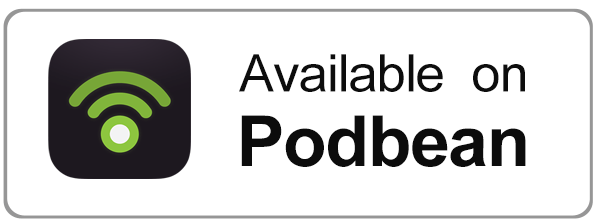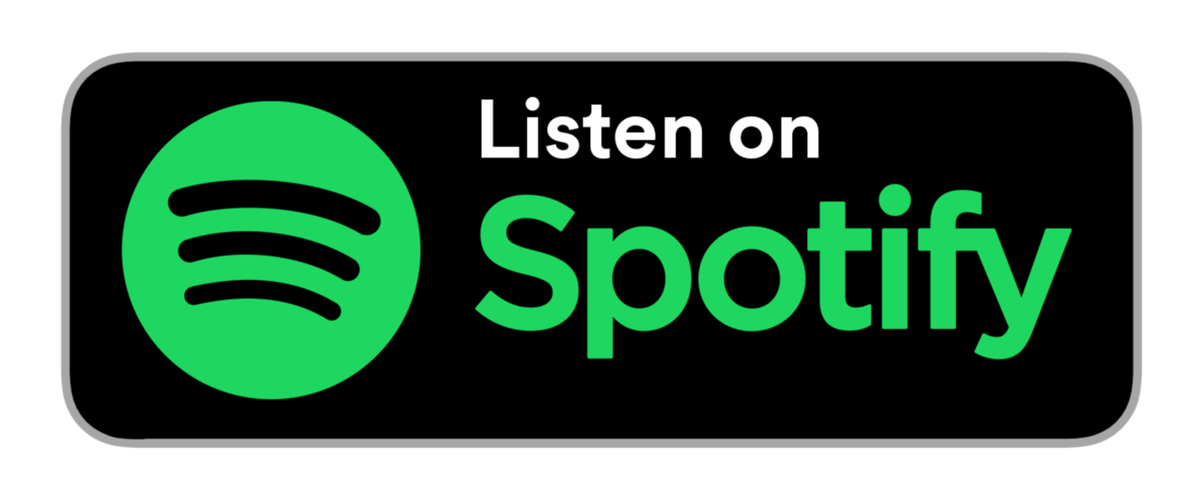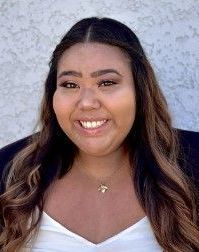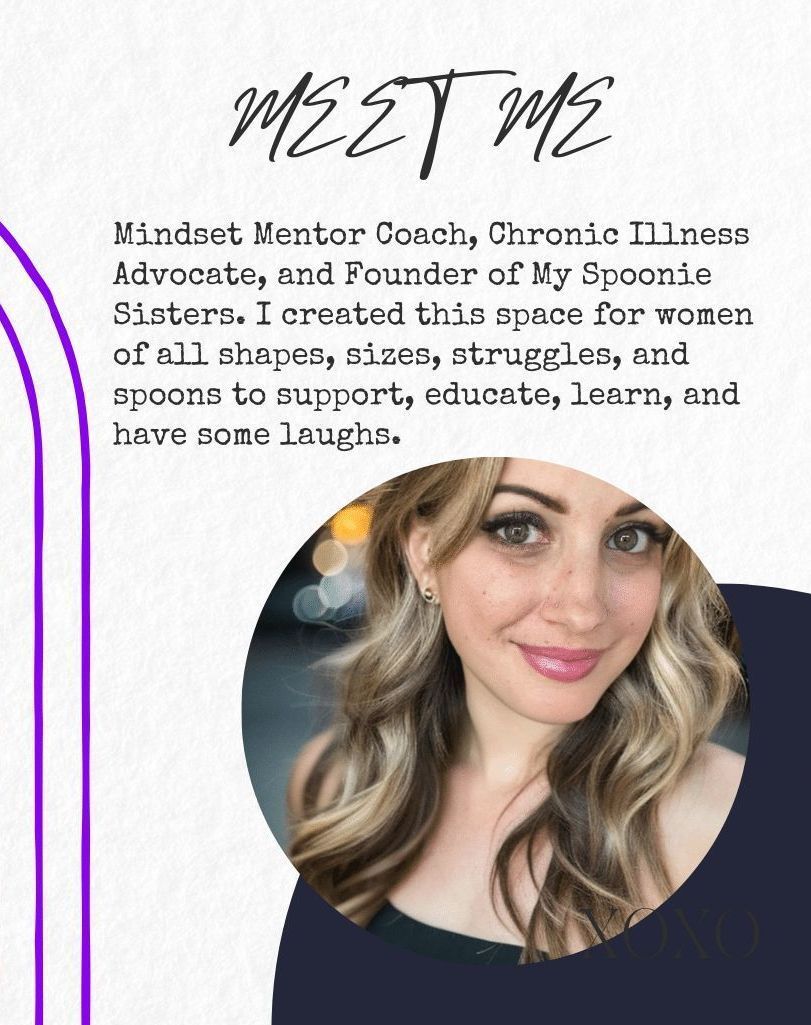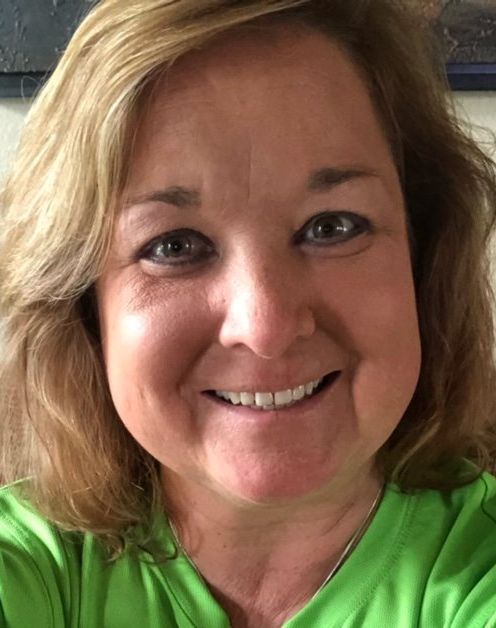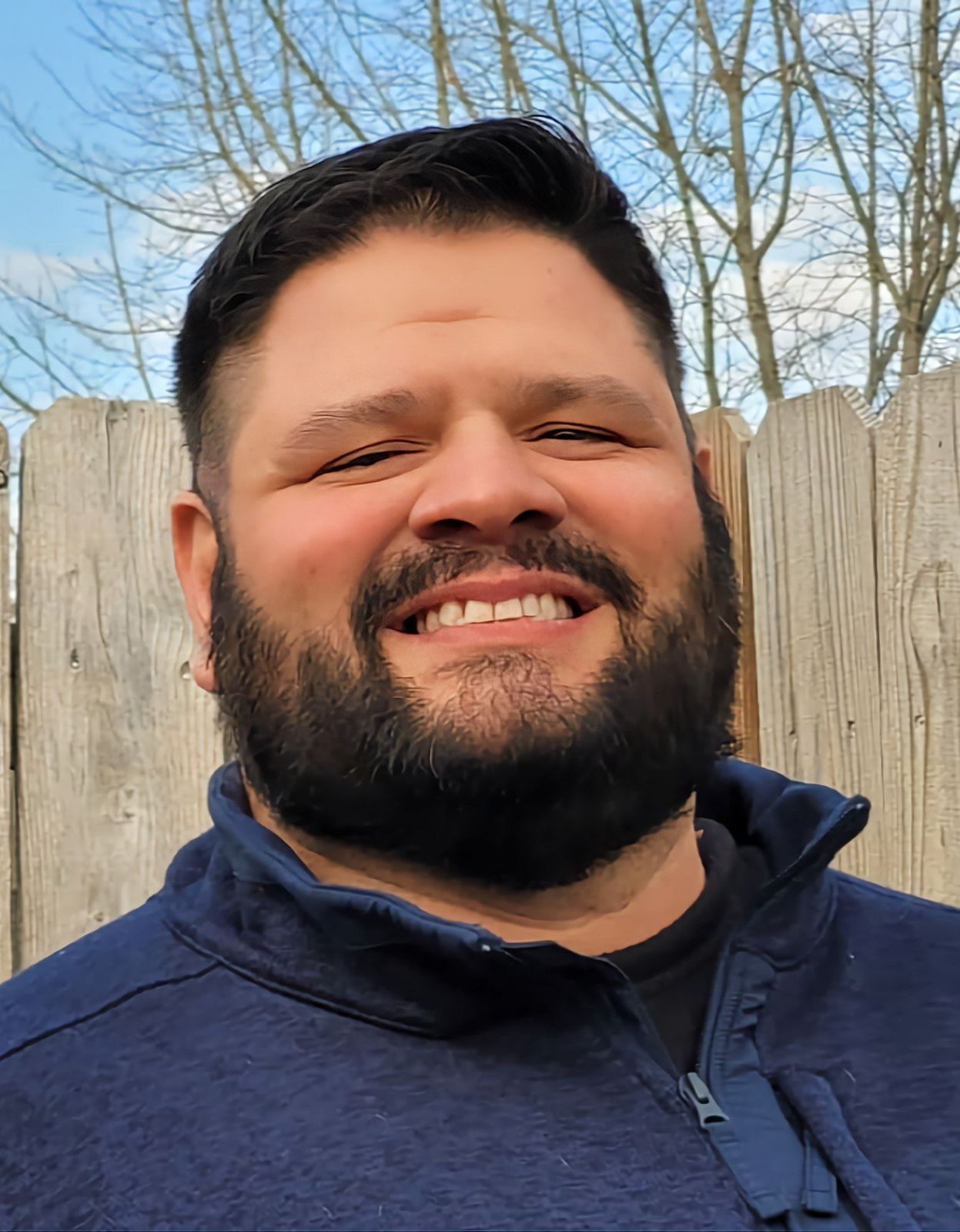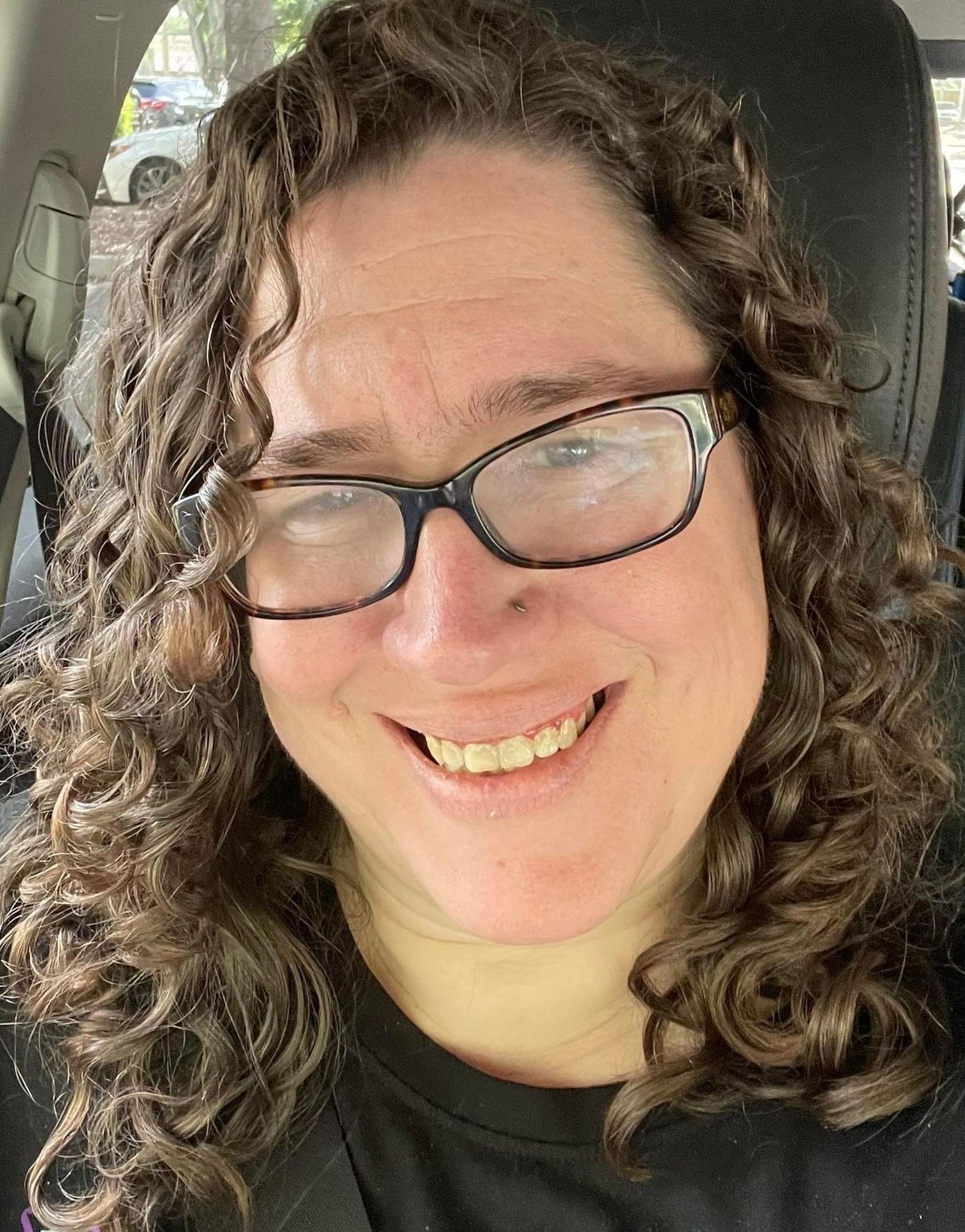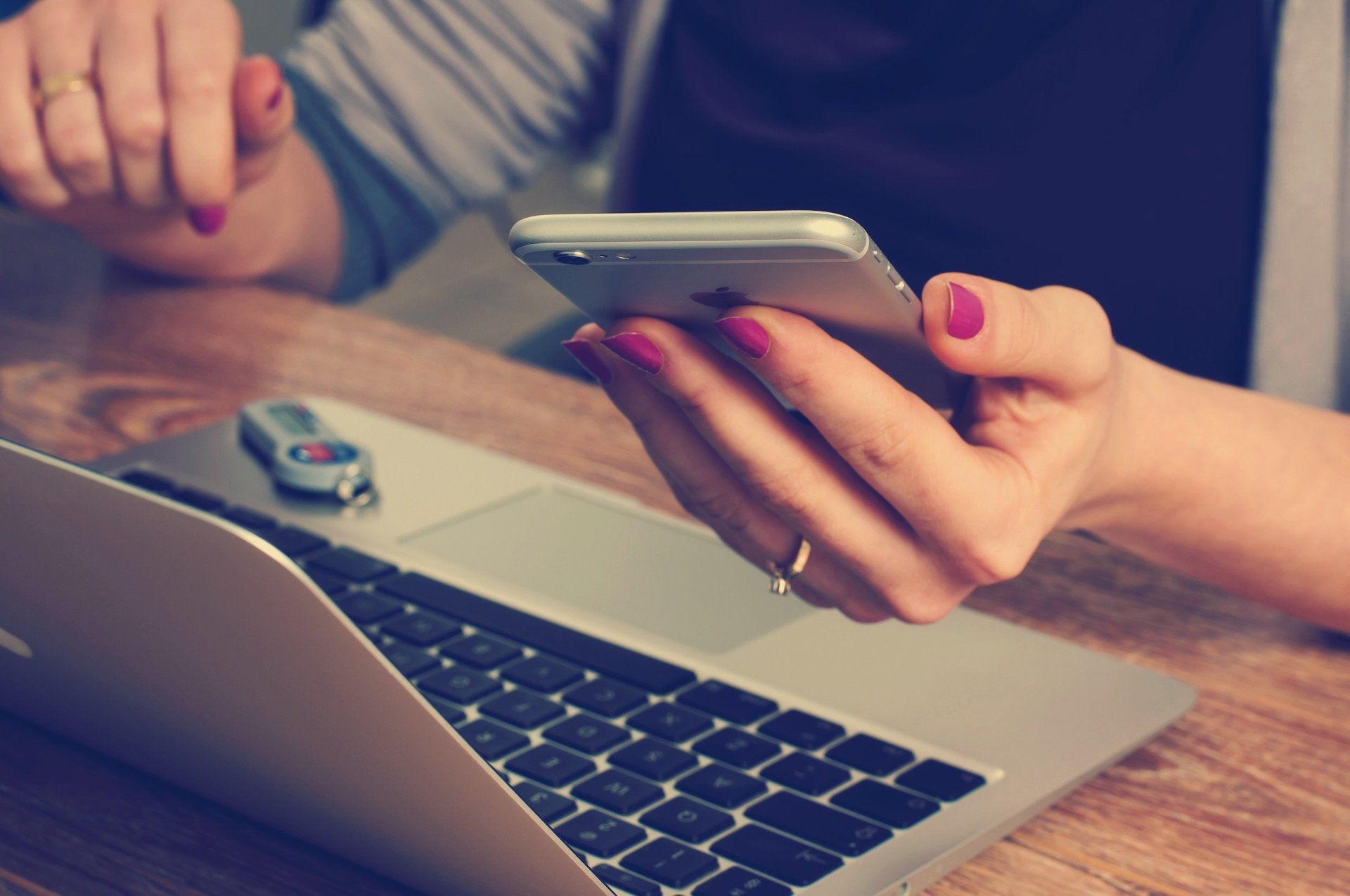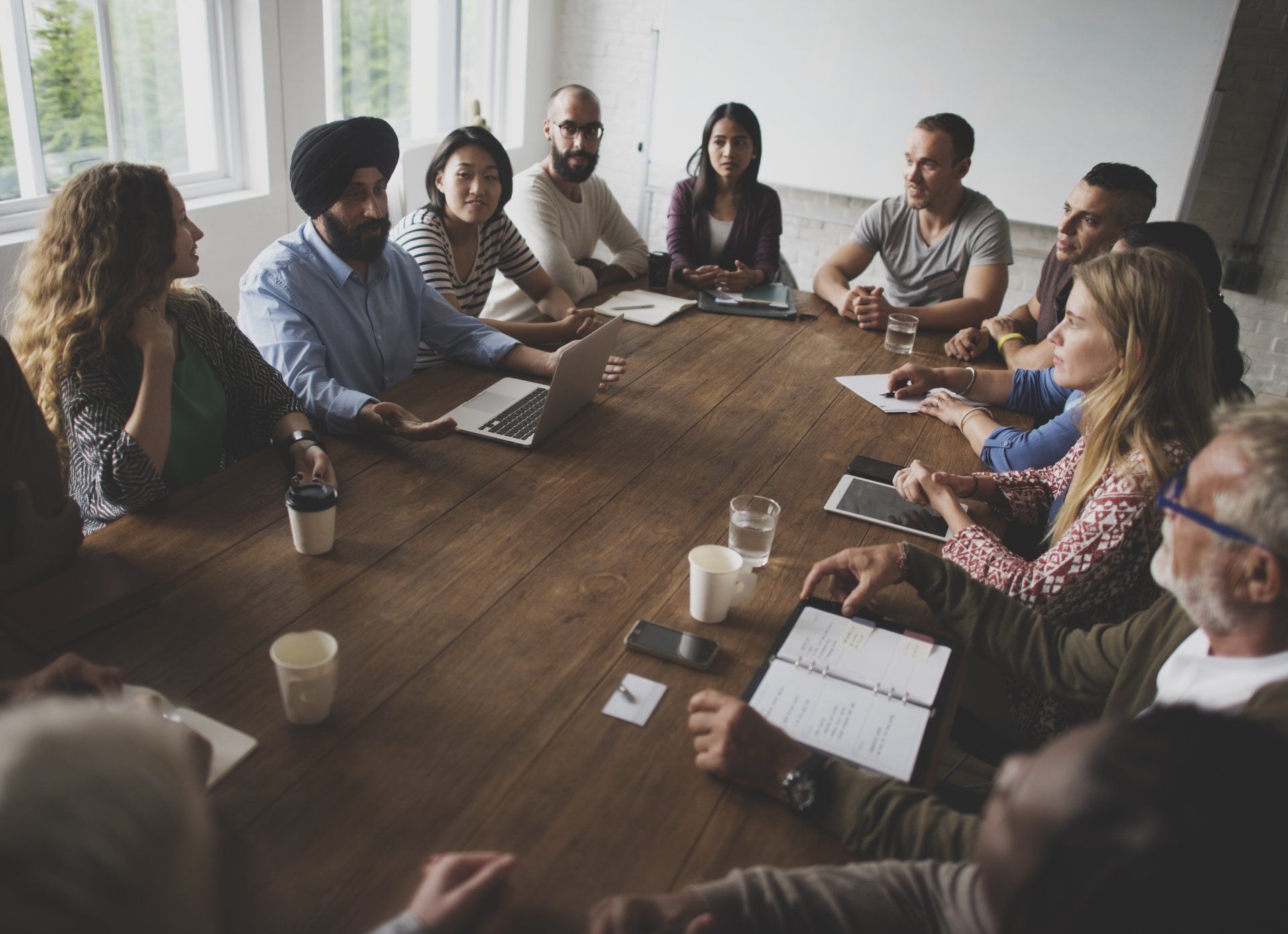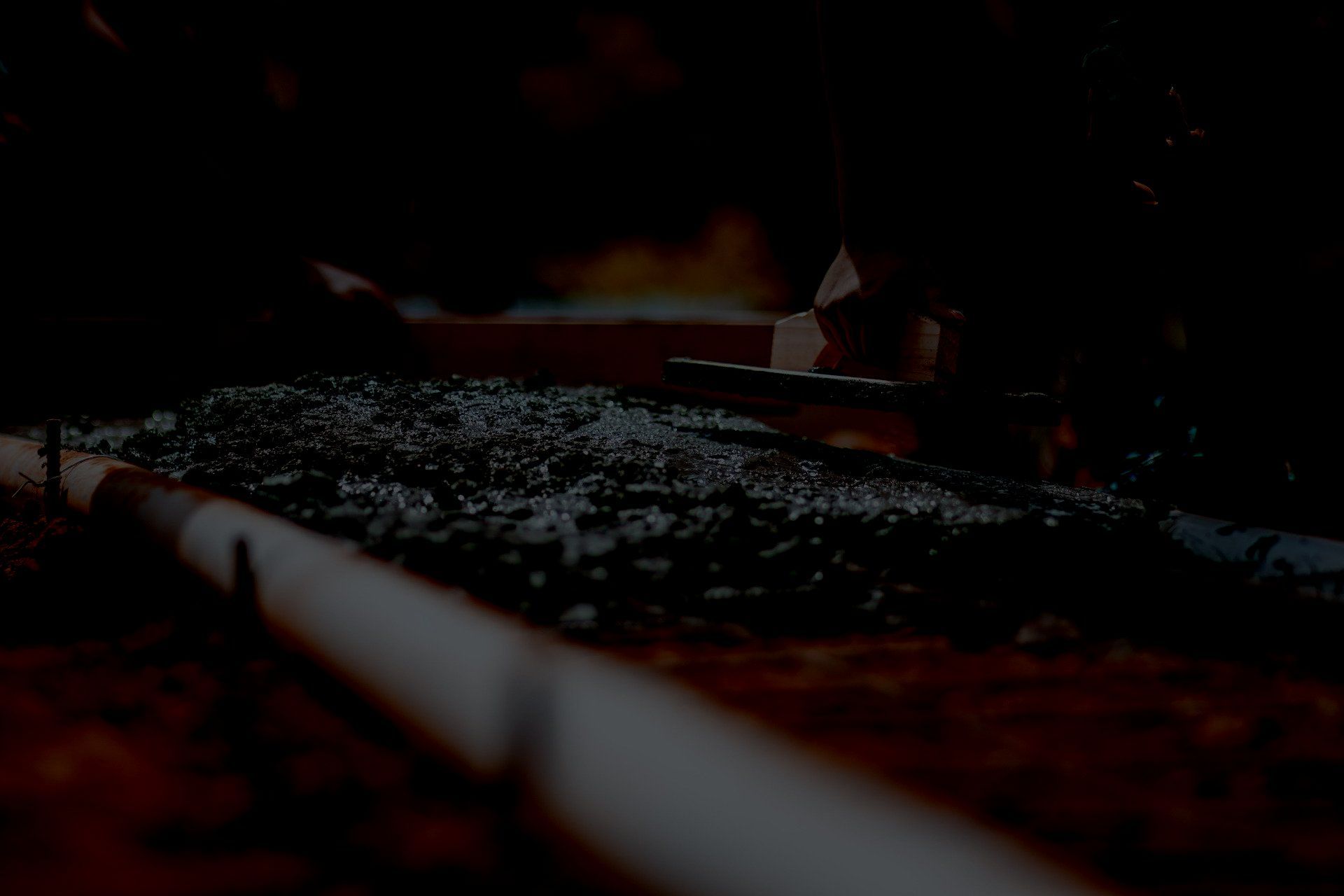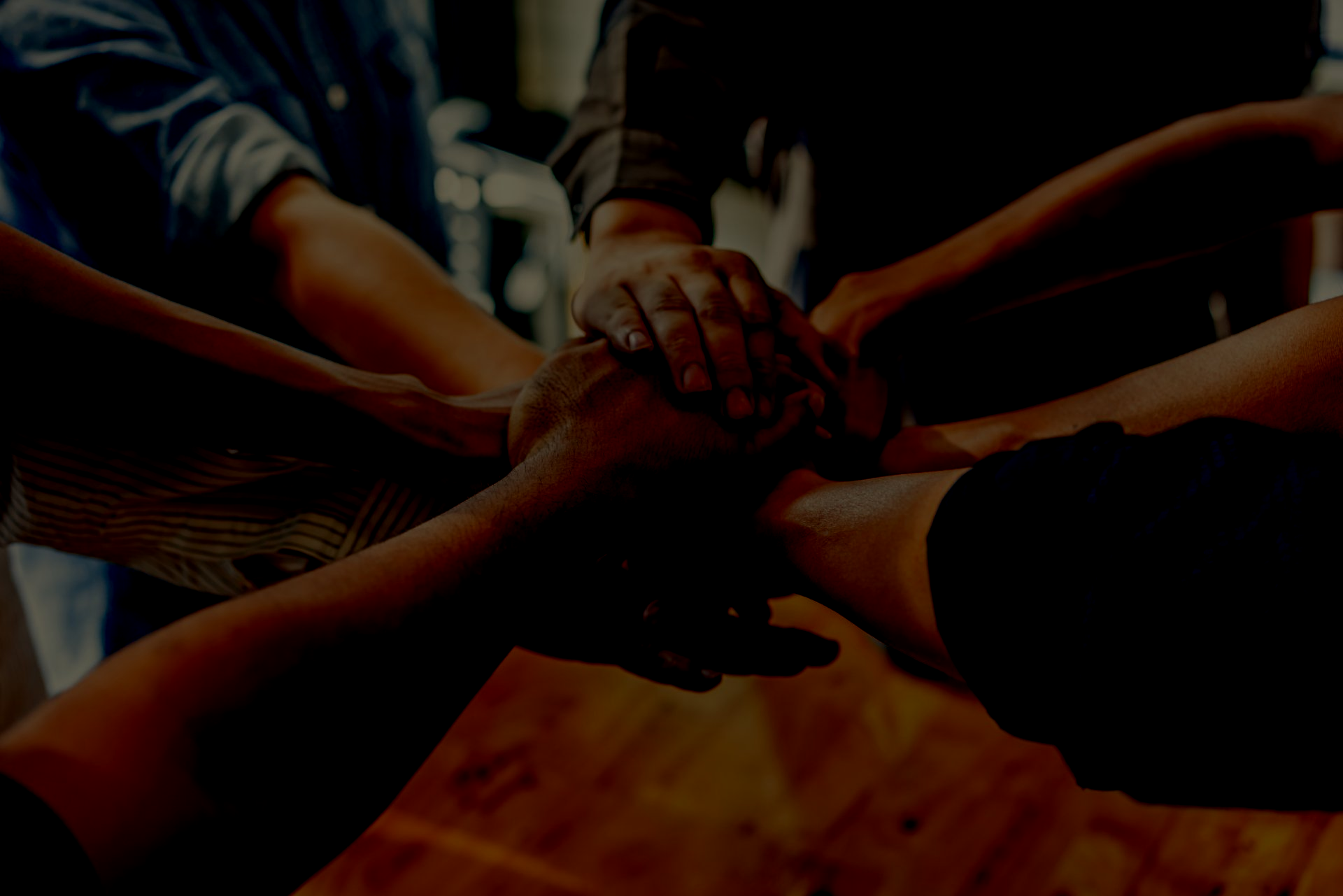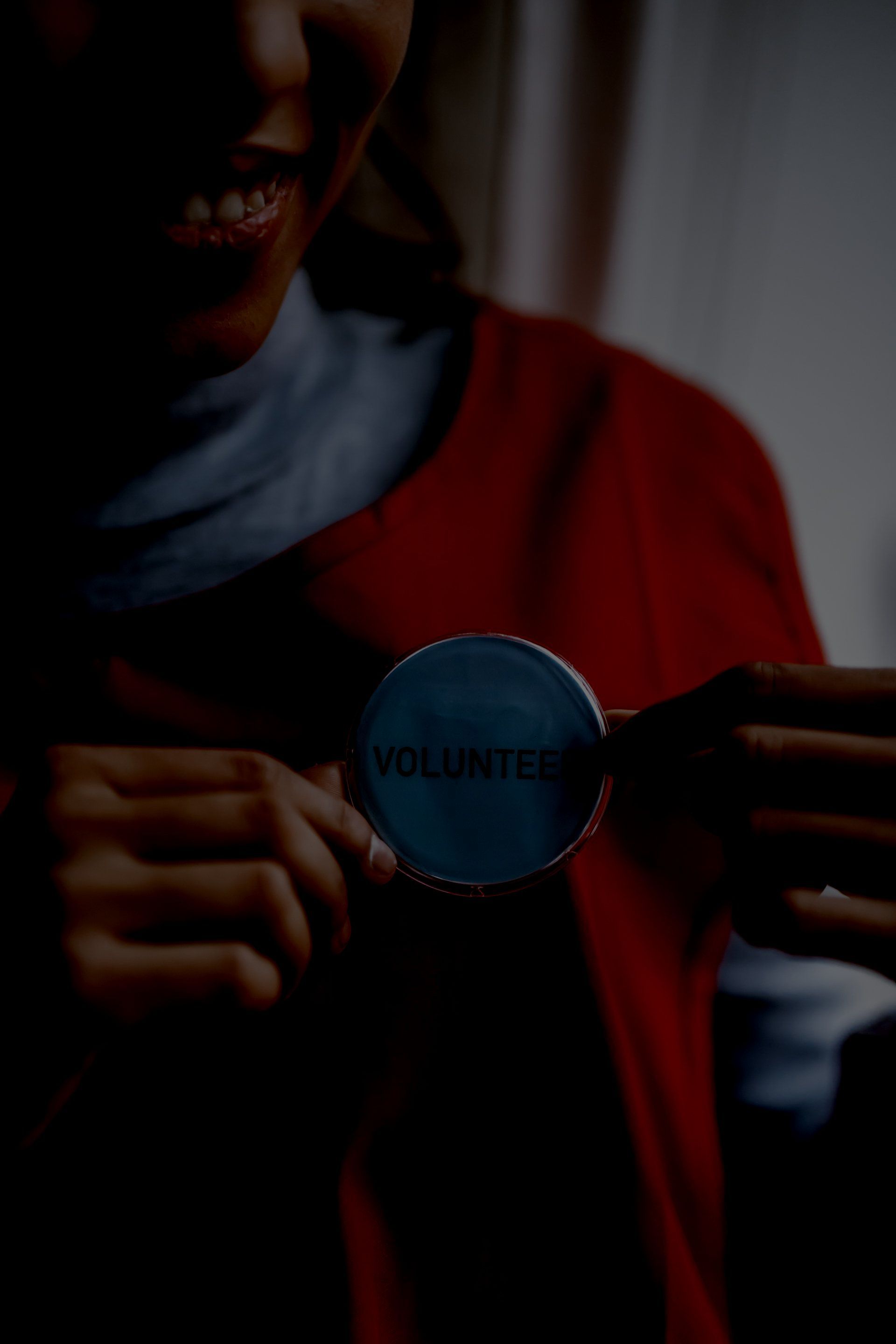- HOME
- ABOUT US
- WHAT IS AiARTHRITIS
- Diseases
- Rheumatoid Arthritis (RA)
- Psoriatic Arthritis (PsA)
- Systemic Lupus Erythematosus (SLE)
- Sjögren's Disease (SD)
- Axial Spondyloarthritis (AxSpA)
- Crohn's Disease
- Sarcoidosis
- Relapsing Polychondritis (RP)
- Systemic Sclerosis/Scleroderma (SSc)
- Behcet's Disease (BD)
- Palindromic Rheumatism (PR)
- VEXAS
- Antisynthetase Syndrome (ASS)
- Mixed Connective Tissue Disease
- JIA
- Familial Mediterranean Fever (FMF)
- HIDS (hyper-IgD syndrome, a mevalonate kinase deficiency)
- Cryopyrin-Associated Periodic Syndromes (CAPS) - Familial Cold Autoinflammatory Syndrome, Muckle-Wells Syndrome
- Schnitzler Syndrome
- Chronic Nonbacterial Osteomyelitis (CNO)/Chronic Recurrent Multifocal Osteomyelitis (CRMO)
- Still's Disease
- All Diseases
- Diseases
- OUR WORK
- RESOURCES & TOOLS
- GET INVOLVED
- CONTACT US
Volunteering with AiArthritis
AiArthritis Voices 360, Episode 95
Air Date: March 3 , 2024
This episode is a Step2, as outlined in our 6 Step Patient-Led Problem Solving Process.
Curious about how volunteering with AiArthritis could transform your life and the lives of others?
In the latest episode of AiArthritis Voices 360 Talk Show as co-hosts Leila, Michael, Jenni, Deeanne, Patrice, and Deb share heartfelt stories of their journey into volunteering with AiArthritis. From personal experiences to the profound impact AiArthritis has had on their lives as patients, they delve into the transformative power of community support. Discover why volunteering is vital and how the AiArthritis community has become a lifeline, offering understanding, empathy, and empowerment.
Join the conversation and learn how you too can make a difference by getting involved with AiArthritis. Find out more here:
https://www.aiarthritis.org/volunteer
Episode Highlights:
- Dive into the intriguing stories behind our volunteers' journey to AiArthritis.
- Hear how AiArthritis has reshaped lives and inspired resilience in our volunteers.
- Explore why volunteering is the key to driving progress for the AiArthritis organization and community.
- Discover the profound support and empowerment found within the AiArthritis community.
- Learn how you can make a difference and get involved with AiArthritis today.
AiArthritis Voices 360 is produced by the International Foundation for Autoimmune and Autoinflammatory Arthritis. Visit us on the web at
www.aiarthritis.org/talkshow. Find us on Twitter, Instagram, TikTok, or Facebook (@IFAiArthritis) or email us (podcast@aiarthritis.org). Be sure to check out our top-rated show on
Feedspot!
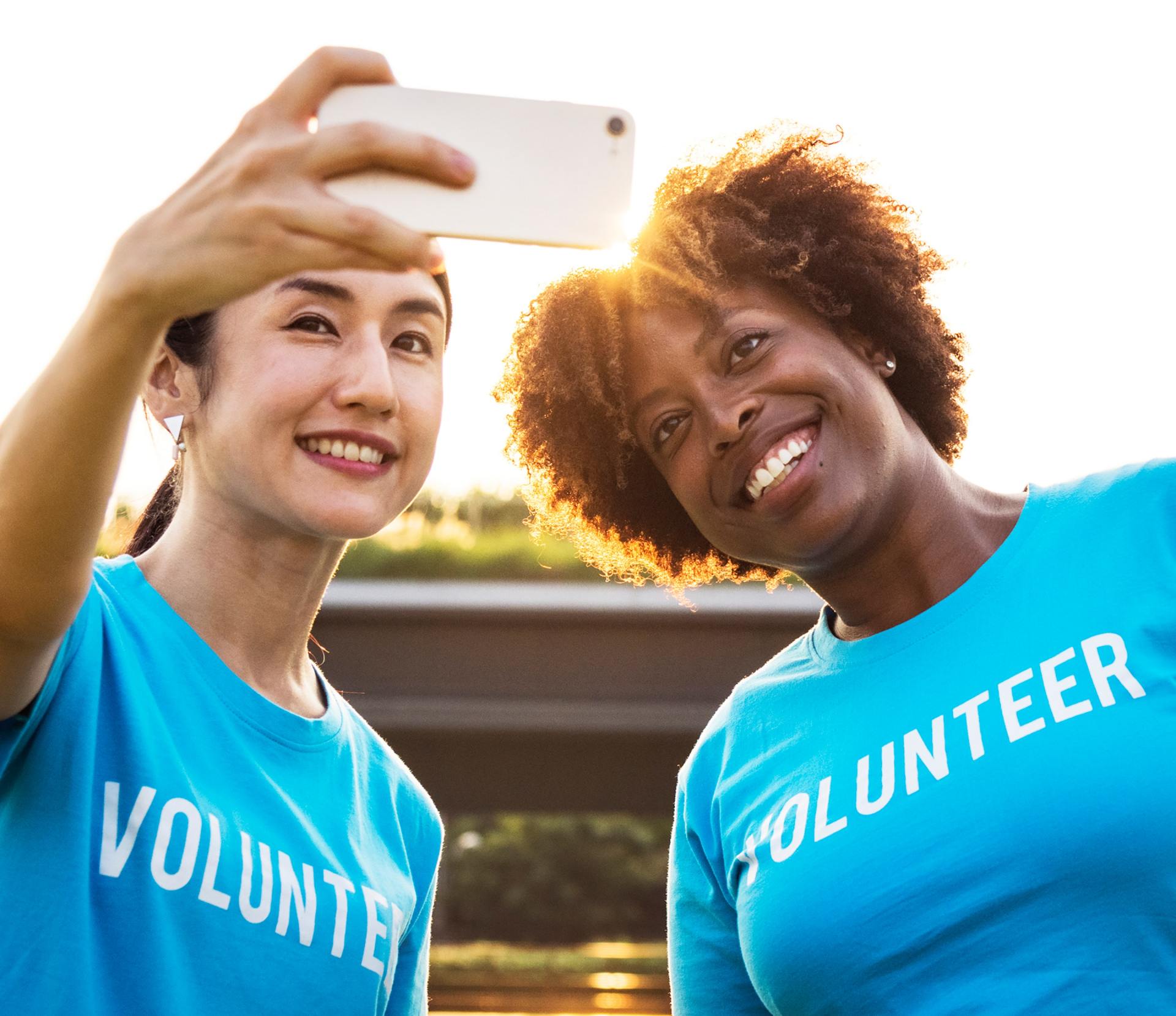
Who is at the table?
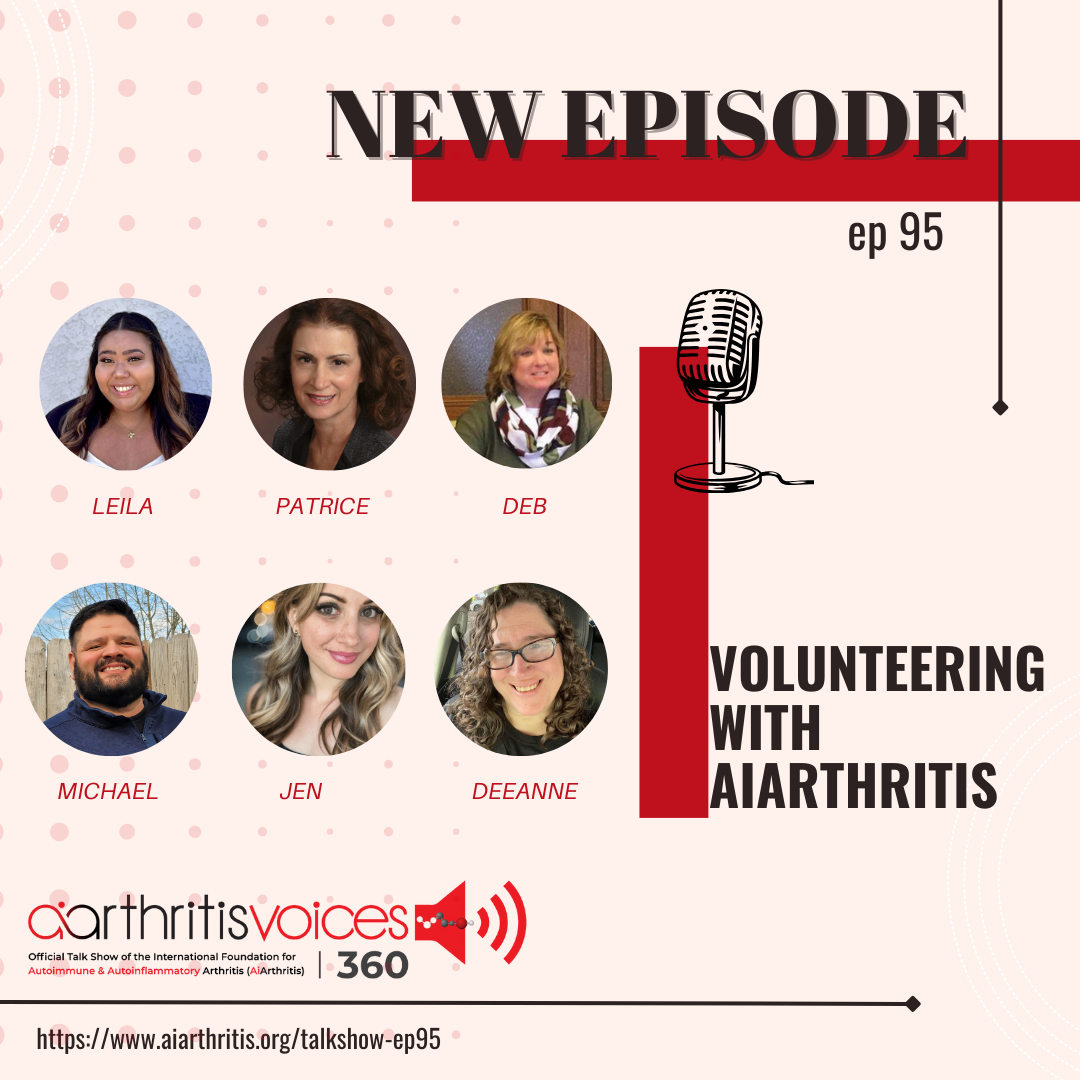
Leila is the Health Education Manager at the International Foundation for AiArthritis.
Jen is a volunteer with AiArthritis.
Deb is a medically retired Registered Dietitian and a Representative for the AiArthritis with Rheumatoid Arthritis.
Michael is a Volunteer and Administrative assistant at AiArthritis.
Deeanne is one of the Volunteer & Administrative Assistants at AiArthritis.
-
Expand to View the Podcast Transcript
[00:00:00] intro: Welcome to AiArthritis Voices 360, the podcast solving today's most pressing issues in the AiArthritis community. We invite you all to the table where together we face the daily challenges of autoimmune and autoinflammatory arthritis. Join our fellow patient co hosts as they lead discussions in the patient community, as well as consult with stakeholders worldwide.
To solve the problems that matter most. Whether you are a loved one, a professional working in the field, or a person diagnosed with an AiArthritis disease, this podcast is for you. So pull up a chair and take a seat at the table.
[00:00:45] Leila: Welcome to AiArthritis. This is Voices 360. This is the official talk show for the International Foundation for Autoimmune and Autoinflammatory Arthritis, or AiArthritis for short. My name is Leila and I'm the health education manager at the organization and a person living with Lupus and Sjogren's disease. I have an amazing panel of individuals here with me today, and I would love for all of them to also introduce themselves to you. So let's go ahead and start with Jenny.
[00:01:12] Jenny: Hi, everyone. My name is Jen Weaver. I am a volunteer. My primary diagnosis is rheumatoid arthritis, and I am in the Vancouver, Washington area.
[00:01:23] Leila: Michael.
[00:01:24] Michael: My name is Michael Guadalupe. I'm out of East Texas. I started out as a volunteer, and I ended up helping out with the volunteer program and other things here. I have Psoriatic Arthritis, psoriasis, and I think that's all I have to add right now.
[00:01:41] Leila: Alrighty, Deeanne.
[00:01:42] Deeanne: I'm Deeanne Quist. I'm in the Orlando, Florida area, and I have rheumatoid arthritis, and I started out as a volunteer and now I'm an employee.
[00:01:53] Leila: Deb?
[00:01:55] Deb: Hi, everybody. I'm Deb Constien. I am a volunteer, longtime volunteer of AiArthritis, and I am diagnosed with Rheumatoid Arthritis since I was 13 years old, so 40 plus years of my journey, and I am tuning in from the Madison, Wisconsin area.
[00:02:16] Leila: And lastly, Patrice.
[00:02:18] Patrice: Hi, everybody. My name is Patrice Johnson and I'm coming to you from Reno, Nevada. I'm a volunteer with AiArthritis. I was diagnosed 13 years ago with rheumatoid arthritis, specifically polymyagular rheumatica or PMR for short.
[00:02:36] Leila: Awesome. And I forgot to say that I am also tuning in from the Orange County, California area, usually very sunny, but not today. It's actually really rainy today. So, ironic because I'm usually the one in the sunny area. Well, I'm so excited to have all of you here today from the introductions you can probably maybe infer what this episode is going to be about But I'm excited to have everybody here today because we're gonna be talking about volunteering with AiArthritis. We are such a big organization when it comes to volunteering, like volunteers are the engine that runs our organization.
World AiArthritis Day, pun intended. Literally, our organization was founded on volunteers. Like we just started having, you know, a bigger staff, maybe about two, three years ago. So the following that we did have was due to all of the hard work of all of the volunteers who dedicated their time throughout the past 10, 12 years of the beginning of the organization.
So we want to give a shout out to all of our amazing volunteers, past, present, and future. Hopefully if you're hearing this, you'll have, we'll have future volunteers coming. And yeah, I would love for you all to hear all of the experiences of our newer and older volunteers. I'm glad that we have a good mix on here.
So that'll be great. I also would like to have Michael take the time to let you all know about the current volunteer program, what's going on, what we're looking for and you know, any other highlights that he wants to talk about?
[00:04:10] Michael: Well, we have been actively recruiting volunteers for the past year and we have been able to get a bunch of them.
And what we do here is we're just basically trying to get, we're trying to get people involved. We're trying to get a group of people to share with us in our awareness stage, trying to get people to share with us their experiences and to help out on the policy side of things, which is a whole other show, because there's a lot of things going on with policy and AiArthritis diseases.
So we're actively recruiting for that. So what's going on that's new in 2024, we are actually big enough that we've, we're upgrading our communication systems, which should be rolling pretty soon, so we're going to be having more communication with the volunteers and just innovating how we're working and we're looking for volunteers that want to do policy to get involved with our coalitions that are brand new and of course we have, World AiArthritis Day coming on May 20th. And that's going to be doing a volunteer push for that as well. So if you'd like to help out, please just email me at Michael@AiArthritis.org so that's what we're gonna be doing here in the next few months. We're going to be more active this year than last. So, we hope to have anybody join us that wants to volunteer, just let us know.
[00:05:27] Leila: And the advocacy program with volunteers that Michael was kind of alluding to is going to be our AiAdvocates program. And we actually have someone that's going to be helping a lot with that program on here too. So Deb, if you want to, you know, take the mic and talk a little bit more about that program, I would love to hear a little bit more too.
[00:05:46] Deb: Sure. So becoming an advocate it is just kind of getting boots on the ground, having our volunteers become more involved with their local coalitions. So they would actually take a seat on their local coalitions and be speaking on behalf of AiArthritis. So there's going to be a lot of teaching that goes along with it, educating, showing you like the ropes of the most basic element of writing letters to your legislators, doing in person visits in your home office.
Hopefully at some point we're going to get to the point where we will all be going to DC together. And having advocacy days there, there's so many different levels that go with it. Where this started with was our knowledges and empowerment committee and working groups. So we were all collecting information and sharing stories, sharing our own personal stories.
Sadly, since I've had this journey for the last 40 years, I have a lot of experiences. So we, it's storytelling and learning how to tell an impactful story, something with attention getters of dollars and cents of what your medications cost, what your out of pocket costs are, what difficulties you're having accessing your medications. Again, the stories go on and on, but we are developing the AiAdvocates and we're going to be empowering all of you guys to be able to do all of these things and have the empowered feeling. When I started my journey with advocacy, I really thought it was, you had to be political and you had to be like Democratic, Republican, and everything in between, which is not my love at all. So, it is nothing about that. You really, it is, you don't go in to criticize.
It's always having a positive attitude when you're talking to your legislator. Even if your legislator is Republican and you're not a fan of Republican, we can all be on the same page, especially with what we are advocating for, and it's for our diseases and things like that. So that's always an aside that I always try to mention about advocacy that it doesn't have to be the political piece that you might in the back of your head think it is.
It's not, it's basically storytelling about what has happened In your journey and what roadblocks are in the way. So that's kind of the easiest way of explaining it. I think in a nutshell.
[00:08:45] Leila: Absolutely. And I bet that's the biggest thing is that our diseases don't, they don't care if you're Republican or Democrat or green party, whatever the heck it is.
It's still going to affect you the same way and that's why those, yeah, that's why those issues are bipartisan. I mean, it's, that's what end all be all is and the advocates program is going to be a blueprint for us to also expand that into our two other pillars of our organization. So we call it EAR, which is education, advocacy and research.
And so as the education manager, what my goal is to have be, I haven't come up with a name for it, but maybe not AiAdvocates, but AiEducators, where I also, you know, deploy volunteers and educate them and let them know how to educate their own peers and be able to spread education about our diseases in their own local areas through local community chats and things like that.
So that's what, and then again, also into the research area of our organization once we can. So that's kind of like the bird's eye view of what is going on in the volunteer sector, being able to want to get all the volunteers and whatever they're really interested in and if they're interested in all three even better. But you know, we want to make sure that the volunteers are doing what they what they really feel passionate about so i'm super excited for all of that to roll out this year. So that is kind of what's in the funnel, but we are going to hit some points of the past of why did all these volunteers come to AiArthritis?
How did we keep them here? How well why, what kind of experiences did they have in order to want to keep coming back and dedicating their time to this organization? So I would love to hear everybody's hero origin stories of how they became an AiArthritis volunteer, and what brought you to the organization. If you want to start out, Patrice.
[00:10:41] Patrice: Sure, thank you. Actually, I had never heard of the organization until I met Deb. We volunteer for another organization and I met her at a conference and she said, oh, by the way, you know, I volunteer for AiArthritis, you know, maybe you should check it out, which I did. And I sent an email to our fearless leader, Tiffany and well, two years later, she contacted me, somehow my email got lost and buried and all of her other emails and that was about five years ago. Yeah, 5 years this coming fall will be my 5th year anniversary of volunteering and I had no idea what her organization was about, but I quickly learned and, yeah, it's been quite the journey.
So I, and I think we're going to touch on that in, in a few minutes. So I will just hand it over to whoever is next.
[00:11:38] Leila: Deeanne.
[00:11:39] Deeanne: I started many years ago, better part of probably a decade. And it was because I had just gotten diagnosed with well at the time it was psoriatic arthritis and I'm a researcher.
So I, you know, jumped into Google and was trying to, you know, find anything and everything I could about it. And it was right around May 20th, which was the, you know, World Autoimmune Arthritis Day at the time we now have expanded, you know, to the auto inflammatory and stuff as well. But there was a kind of, they had something set up for like with different rooms that you could join and people, you know, would give information stuff.
So I was there just mostly to learn myself, but then I'm like, Hey, I really like this group and I always want to try to find something, you know, that I can help with and that's how I got started.
[00:12:31] Leila: That's awesome, Deeanne. I can't believe that you said that you've been volunteering for almost 10 years. That's a, that's some dedication, you know, and now you're a staff member, like you said, so there must have been really something that kept you coming. So I'm glad to hear that. One of our newer volunteers is Jen, I would love to hear how you came about with AiArthritis.
[00:12:52] Jenny: Yeah so, you know, I've, I've been dealing with rheumatoid arthritis since 2011 officially diagnosed in 2012.
And a few years ago, I just started searching Instagram high and low looking for all the organizations and trying to figure out how I can get involved, how I can learn more so I can help serve others to the best of my ability. And you know, a year ago, I had someone from AiArthritis, reach out to me about getting involved with the World AiArthritis Day.
And I was super excited to jump on and help out however I could, you know, I'm not always present, but I, I love helping out wherever my skills can, can help best. And, and that's really how I got involved.
[00:13:37] Leila: I think that's something to note also is that, you know, with our volunteer program, we all know that all of us have these diseases.
We know that it's really hard to stay consistent with anything. And we're really here and ready for you whenever you're ready to be able to give any of your time. But there's no pressure in, you know, putting 10 hours a month or anything like that. We really are here to support each other and get help as much as possible.
But yeah, I think that's something that, you know, we we're always welcome for people like, Hey, I'm gonna take a three month break. I'll be back, don't worry. Like, we're always super open to that. So I think that's something to to note is that that may be unique with our organization, that we're super understanding when it comes to when people have their ups and downs with these diseases.
Deb, I would love to hear how it came about with you, because I actually really don't know this story.
[00:14:28] Deb: So, it's been over a decade, too, that I have been volunteering, and it started with a Google search. I was involved with other things, but I just wanted to just kind of see what else was out there and ran across AiArthritis and it was, it was literally one of the first groups that popped up on Google, which I guess it surprised me at the time because I hadn't heard of the group before and started looking through the website and I'm like, wow, this is really kind of a cool organization. And something that always stood out to me was basically what you were just saying, Leila, is you are never over asked unless you want to do a ton of things as far as what your involvement is. You're never tapped in more than you can handle and everybody at this organization is so sensitive to all of that. Because again, we all walk that walk and talk that talk. We get it. And we all know when we have bad days that I'm not getting out of bed today. So sorry, I'm not going to be able to help out with that video and there's never a guilt trip or anything like that.
And I remember the first ACR that I attended, I knew nobody. And I ended up rooming with our CEO, our fearless leader, Tiffany. And I was scared to death. Again, I'm an extrovert and you know, my husband and my son are introverts. So I get what that all is, but then just meeting everybody, I was scared because I'm like, I'm sharing a room with these people, but it was probably one of the most fun things that I ever did in my whole life, as far as getting to know everybody, we're all, you know, we're all walking the same in the same shoes, and it was an amazing meeting of minds, and we all had fun in our own ways, just getting to know everybody, just sticking my toe in there, that took a lot of like effort on my part to actually say, sure, I'll come to Chicago and go to the ACR with y'all and, you know, go to the sessions.
My background is I'm a medically retired registered dietitian. So I understand all of the research and that's a big part of what I've been helping with is bringing back the latest and greatest information in patient friendly terms. So we can kind of keep everybody in the loop of the latest research out there and what's coming and things like that.
So it's always exciting to be able to help with those type of pieces. So that is my intro into AiArthritis over 10 years ago and it's, been quite a ride and I've loved every minute of it.
[00:17:44] Leila: That's awesome. I've had to, I've got the time to spend two ACRs with Deb by now. And I mean, who would have thought that Deb from Madison, Wisconsin and Leila from the Bay Area, California would be friends.
I mean, despite our age difference, despite all of the different differences, AiArthritis has brought us together and we truly are friends. So I think that that, that just goes to show all the different connections you can make through these opportunities. So I think that's really awesome. And last but not least, we have Michael who started out as a volunteer for a little bit, but ended up being a staff member kind of like almost immediately after starting with AiArthritis.
So let us know your story.
[00:18:24] Michael: Well, it's just that my wife actually worked for an arthritis foundation, she met Tiffany, our CEO in different settings, in CRS or what have you. She told me a story. I do not remember, but then she became Facebook friends with Tiffany. And Tiffany was, she was doing a push for volunteers last middle of last year.
And they needed just a lot of things and in my traveling, I've learned how to do a lot of things as far as tech and as far as, um, like other little things I could do, just have a lot of, I have a broad skillset which is not suited for like one job. There you go.
[00:18:59] Deb: You've saved my life more than once, Michael.
[00:19:04] Michael: Again, random knowledge is that's all it is, is random knowledge. So I offered all of my random skills and as a volunteer. And it was funny because I went to my first meeting last year. I can't remember when it was June, July, something like that. And I think I met Deb and I met Patrice that day. And everybody knew my wife and I'm like, how do you know my wife?
I'm like, all right, I'll let that go. And, but it's funny though, cause it was like, it just shows how small the community is because she worked at a different organization. She works at a different organization now and yet she still runs into the same people. So I'll call it chronic disease space is really small.
It's a big, it's a big world, but it's really small. So we'd like to invite everybody into it as a volunteer. I just want to, that's how I started. And now that we're doing the volunteer section, I just wanted to reiterate that, yes, we are looking for, we do give you the time to heal, if you need time to heal. We've taken in volunteers like one of them had just a huge flare up and she was in the hospital for a long time and we waited, you know, and I just, you know, I kept in touch with her. Hey, how you doing? How you feeling? And it worked out though and now she's contributing. And sometimes I feel bad cause I don't want to overwork her.
But like, she's really into, you know, just helping out with the little things and it helps out a lot. So we do need help and it is very, very situational. So if you do have a stretch that you cannot be involved actively, there's always something you can do if you just want to say, do something small like Jenny says, she's not active.
I have to, I have to correct her on this. Every time I ask her for something, any, like I'll ask her, Hey, could you shout out this or shout, or do this and she's always there. So like, she may think she's inactive, but like, I know I can count on her to do like, if I ask her to do something, she'll either A. Help me out with it or B. Just do it for us. And I, we always appreciate that. And I love all the volunteers. I really do mean my favorite time of the month is the volunteer meetings because we have a good time. So that's how I got involved and that's what I'm doing now.
[00:20:59] Leila: Yes, amazing. And I think, you know, going off of all of, you know, how you got here, we want to know also how we got you to stay.
So definitely like anything that has been your favorite experience with AiArthritis overall. I would love to hear about any specific event that you helped with any task that, you know, really stood out to you, whoever wants to go first, I think we can just like chime in. I don't need to like call on people.
So,
[00:21:24] Patrice: I have to share a funny story first before I go over my favorite things. Tiffany, our CEO and fearless leader, and I share the same birthday, different year. She's a lot younger than I am. Anyway, back, well, when COVID hit, we were scheduled, Deb and I, and I, and Tiffany, to go to EULAR, which is, I forget the acronym.
I'll let Deb explain so on this and I'll let her explain all that. But anyway, it's a big conference overseas and it includes researchers along with patients whereas a lot of organizations that do research do not include patients. So we did this virtually and it was just an amazing experience for me. I didn't get to meet the researchers in person, but you know, we listened to all their videos and we did, oh yeah, the debriefs afterwards were so much fun because we usually held them at cocktail hour with usually a glass of wine and snacks, but they were actually kind of funny, but they, you know, it is serious.
But anyway, for me, it was just so eye opening. These people that have dedicated their lives to helping patients live their best lives and finding solutions to, I don't know, pain management, fatigue, even brain fog has been discussed, which a lot of people just kind of in the research world don't think that that exists, but as patients, we know it does.
And then I also got to do a virtual ACR. I don't have a science background. I think I got a D in science biology in high school. It has never interested me until I was diagnosed with rheumatoid arthritis, and I think, you know, like myself, I've always never had an interest in the research end of it, or the patient engagement or patient research partner but it is important. I think you have to understand your specific form of rheumatoid arthritis in order to live your best life and also be able to discuss with your rheumatologist or whoever is in your network of of care providers that when they discuss in these terms, you can actually understand what they're talking about.
I do have to confess both on EULAR and my first ACR, I did have to go back and Google a lot of the terms. They were just so unfamiliar with me, whereas both Deb and Tiffany are very well versed in all this. So those are my two favorite things of being involved.
[00:24:06] Deb: So EULAR is called the European Alliance, I had to look it up, European Alliance of Associations for Rheumatology.
So that is the European version of the scientific meeting that happens in different parts of Europe. And the ACR is the American College of Rheumatology. And that is somewhere within the states as far as that goes. So I agree with you, those are some of my favorite pieces too, because I love getting my fingers into and learning the latest things that are happening on the horizon.
Lupus was something that was just highlighted not too long ago. And, it was kind of exciting to share that information back with Leila. So again, it's the walk of life you're living. We have a program called Go With Us. So those, the debriefs that Patrice was talking about are the sessions that we go to, we do a quick debrief about what the crux and what the golden nuggets are that we learned during those sessions.
So the takeaways from each one of those sessions and that is some of my favorite things, but again, I have so many favorite parts of AiArthritis as far as the, again, EAR, education, advocacy, and research. I've got fingers into all different arms of those things and love being an active member of all the different groups and I don't think I can say that I have an absolute favorite because it kind of all is favorite and everybody that I've met through AiArthritis has become part of my, my tribe, my community, my family.
I feel like we all understand when we're having those bad days. I know Patrice just like on social media, just ask questions about just pain in her rib area. We're like, yep Costochondritis Yes, it, it's like been there, had that, had injections in my, coastal cartilages and yeah, you do feel like you're having a heart attack because every breath hurts. So yeah, we all, we all get it. So that is my, all my favorites in a nutshell.
[00:26:37] Deeanne: I wanted to also agree that people are genuinely likable and lovable and makes it, you know, a lot more fun. And another thing that I like about the organization is that we don't duplicate efforts. That's one of Tiffany's big things.
So everything we do is unique and we're, you know, able to do something that's, you know, no one else is doing. And I think that's a really awesome part of volunteering for the organization.
[00:27:05] Leila: Yes, it's the innovation is, is one of our biggest things that we focus on and it sets up for a very unique situation because we haven't done things, we don't do things that other people have done before, we are always kind of not reinventing the wheel, but kind of, you know, inventing the wheel of what we're doing.
So it calls for a lot of trial and error, and for us to kind of learn how to do things together. And I think that also, therefore, also builds a, a bigger like sense of community and things like that too. So I, I totally agree with all of you in that sense too. So we have Jenny and Michael, any standout moments of being a volunteer?
[00:27:46] Jenny: You know, for me, I think it was working on the, the World AiArthritis Day last year. It was so much fun. It was incredible getting to know so many people, hearing from so many people, the knowledge that is shared. It's like I said, it's just incredible. And I got the honor of even being a guest on there.
And I'll tell you, you know, I'm a host of a podcast, but when you're interviewed, that's something so different. I get terrified every time. I feel the pressure and yeah, but you know, everyone was so kind. And you know, I just can't help but keep wanting to come back and learn more, talk to people more and find out what else I can do to help.
[00:28:30] Michael: Yeah. And I, I'm going to add on to Jen, Jen's World AiArthritis Day stories that we had people from literally all over the world there. I was seeing, we had Singapore, we had, we had one person in Africa there. We had actually had a couple of people that weren't actually presenters if I'm not mistaken.
I remember he's foggy. So, don't hold me to that one. So we, you know, but we had people, some of the moderators were from Brazil. One of them was from India and then another moderator was from I waited a couple from Canada. So it was truly a worldwide effort. So that's part of what I like, but what I love, I mean, I truly do love the volunteers.
I am a people person. I like hanging out with everybody before the meetings, meetings I'm not too into, even though I'm running them sometimes. But no, the, the before and after is actually the most genuine part of it and the meetings in between it's great because I feel like the connection we have as a group, it kind of propels us forward as an organization and we were able to do more because of it like it makes us more productive as a whole group. That's what keeps me coming and that's why, you know, I, I do it every day.
[00:29:32] Leila: That's awesome. I love hearing all the stories, and I think another takeaway from that is, people say this a lot in business, but I feel like they don't really back it up, but it really matters about how you make people feel.
It's not what you do, it's how you make people feel. And from hearing all of your stories, that's exactly what is keeping people here, is Michael and Deeanne reaching out to the volunteers when we haven't heard from them in a while. They feel so special every single time they know someone is checking up on them and seeing how they're doing and wondering where they are.
We have all of the other volunteers that have been here for so long like Deeanne and Deb and Patrice that are so welcoming to all of the new volunteers and they really do it's not a It's not a, a club where we're like, Oh, it's exclusive. You can't come and hang out with us. It's really more of like the more, the merrier we, the more active volunteers we have, the more that we know that we can get done and do for the bigger community.
And so I think that is one of the biggest standout pieces that I kind of hear from hearing all of your stories. One of my favorite things last year was also World AiArthritis Day. It was the most stressful thing to put together to coordinate everybody in all the different time zones, but it was so worth it.
It was so worth everybody being so excited about it. And I'm really glad that we, we got a new volunteer out of it, we got Jenny out of there, we got all of our other volunteers or friends of the organization that we got from that day are still tagging us in posts, wanting us to repost, and they repost our things, and it just makes such a big community effort in that way.
So, we have one last point that I want to hit here. It's how has it volunteering with AiArthritis made a positive impact on your life? And of course we talked about the social aspect of that. I would love to start out and say that I would never have been on a call with five other people that have similar diagnosis to me before I ran into AiArthritis.
I had never gone to a support group to an education seminar or anything having to do with a clinical trial or anything like that before I stepped foot in AiArthritis. And so, feeling that community has been so great. Michael always talks about it, but just being able to go to the volunteer social chat and be like, Hey, I'm feeling this, have you all felt this? It is the most, like, validating thing in the world to just hear everybody else's opinions, what they, they've gone through, what they suggest. I mean, you know, we're not always going to take their suggestions, but just knowing that other people have gone through similar things to you, it just, it warms your heart because having these diagnoses can feel so isolating and lonely in our everyday lives.
So, okay. How has AiArthritis impacted your lives positively?
[00:32:32] Deb: Actually, Leila, I, I'm going to request that you share how you found AiArthritis.
[00:32:39] Leila: Or what was found out after I found, found out about AiArthritis. Yes, yes, yes. So I actually found AiArthritis because I quit my job and was doing freelance on Upwork.
I found that there was a executive assistant position and they're like, Oh, this is an organization that has to do with lupus. And I was like, what? Oh, sure. I'm going to apply. I applied. I found out that they're in the St. Louis area. And I have an uncle who is a rheumatologist in the St. Louis area. And just so happened to be Tiffany's rheumatologist and we had no idea.
I reached out to him individually and I was like, Hey, uncle, do you know this organization? I just applied for a position. And he's like, Heck yeah, I do. I can't say exactly what he said because he's a little bit of a potty mouth, but he was like, of course I do. I'm going to go email or text the CEO and tell her to make sure that she interviews you.
And I was like, okay, sounds good. And that uncle is, is Dr. Al Kim, who is one of the co founders of Rheumy Rounds, which is our segment of the talk show that where we have rheumatologists and patients at the table together to discuss issues. And I didn't even know that before I applied for the organization.
His wife is literally my mom's first cousin, so he's like actually my uncle, I have to say that because in Filipino culture everybody can be your uncle, so I had to like be, be specific that he's like actually my, my mom's cousin's husband, so my real uncle. But yeah, that's how I knew that I was, I was here at the right time in the right place and I needed this to be a part of my journey.
So that kind of just validated it for me so yeah, that's, that's also impacted my life positively because it's been like one of the funniest things to talk about when it comes to the organization. And when we were at ACR and we see him and all these kinds of things, it's, it's, it's really funny to be completely honest, but it's also amazing that we're both involved in this space and can have that to talk about it and, and, and in common.
[00:34:47] Deb: Yeah. I had to bring it up.
[00:34:51] Leila: No, for sure. Um, but yeah, any other positive points that how AiArthritis has changed your life?
[00:34:57] Deb: So going back to even the beginning, because, um, some of our newer volunteers may not know this phrase, but you can move mountains from your couch. Literally you can do anything. I know, Michael, have you not heard that? Because you just look surprised.
[00:35:15] Michael: I never heard that. It's great.
[00:35:17] Deb: So it is moving mountains and we can do anything, even if it is from our couch and doing some work from our laptop or whatever. So it is AiArthritis is there and they've got your back as far as all of that goes because they support you in any way you need it, and I think that has, you know, been such a positive piece of my life and helped me always keep a positive perspective.
Everyone's like man, everything you've been through, how can you have such a positive outlook, and I'm like, it's better than being and again I'll use my own name, a Debbie downer. And I don't want to be sitting in a pity party about everything. Let's learn, let's try to improve my life and look to the next side and just always try to look to the positive side versus sitting there with bad coffee and sitting, sharing stories about how much your life sucks.
Well, my life, I, I've had my moments, but my life has been very fulfilled being with all of you guys in my life and being part of AiArthritis. So that's my two cents.
[00:36:50] Patrice: So, when you volunteer with arthritis, you'll hear 2 things you have a seat at the table. So, that's the 1st thing. So, if you can imagine a round table, and there's patients, doctors, researchers, pharmaceutical companies.
And we are all seated there and the next thing you'll hear is we are the patient voice. Early on when I began to volunteer with AR Arthritis, Tiffany always told me, your voice matters. What you have to say, okay, I have not been on the RA journey as long as some people, but she always told me, she says, your experience counts, your voice counts.
What you go through is unique to you. And those are the two things that I love about this organization.
[00:37:42] Deb: And we're all equals at the table.
[00:37:45] Patrice: Yes. I forgot that. Thank you.
[00:37:48] Deb: I knew, I knew where you were going and I just wanted to finish the thought.
[00:37:55] Leila: Thank you. I love hearing all of Tiffany's catchphrases when she's not here.
That's how you know she did a great job because she she ingrained it in all of us. Yes.
[00:38:05] Jenny: I think I just want to echo exactly everything that all of you have mentioned is the community, the friendships that are built, the chat is phenomenal. I I can't thank you all enough for some of the insights and answers that come through there because sometimes it's a question I didn't even think of that someone else brought up and the answers are really useful for us to consider using in our lives.
So definitely all of all the friendships, the community, it's a great feeling.
[00:38:36] Deeanne: I think that the organization really listens to you so any anything that you have a question about, like, when I was, you know, I was looking for a job and I'm just like, hey, Tiffany, do you know anything, you know, anybody that do like you know, work from home that's legit, you know, this, those are really hard to find right now and, you know, she's just like, Hey, let me get back to you on Monday. I've got, I've got some thoughts.
So, you know, that's how it was positively impacted me. I think is that, you know, they really care and they will answer anything that, you know, is an important question to you.
[00:39:12] Michael: Yeah. I, I like, I mean, I like what we do here. I actually love what we do here and what the positive impact. I mean, yeah, I always talk about the support group. It's not even a support group. We do not have a support group. We have a group of volunteers that care enough about each other that if you bring something up, they're going to answer it.
So we do not have a support group, but I have a, I have a group of people that I can help support, which I love. So I keep talking about that and leave it alone. What I do like now is the part of that we're educating too. We educate our volunteers so that they can, they educate us as well. We collaborate with volunteers to share their experience, to make it into education for people, just anybody in general, you don't have to be a volunteer for that.
But your experiences kind of propel our education. And also this year coming up with what that was talking about with the AiAdvocates, we're, we're also doing education there too, because being an advocate, it's not something like you don't walk into the world knowing how to do this. So, you know, we're here to teach you that there's a skill to it and there's a,
there's a little bit of a craft to it and you don't have to learn it all. You just have to like I cannot read. Okay. It's known, it's a known fact. I can't read off a teleprompter, but I can speak to you at a normal tone. And I can tell you, this is the story. This is what we want to convict. We want to basically help people find their voice and find a way for them to craft a story and, and meet some of the lawmakers and you're going to be sitting in a room with a, somebody who wants to earn your vote.
So they're going to like you for that, for those 15 minutes. But B, you're going to be able to talk to them about policy and realize that they hear your story and they may not be able to do something about it right now because of whatever, but they actually heard your story. And that sticks with them in their mind at some point.
So these are all these opportunities that are coming through with the volunteers. But I just wanted to stress that we're educating the volunteers and we're educating the public. So that's what sticks with me the most, because I just love being able to teach somebody something or having them teach me something.
So that's, that's why I think that's the most impactful and most positive impact that this organization has had with me, those opportunities.
[00:41:15] Leila: That's amazing. And I think I really feel like sometimes when you say like, okay, I'm going to go volunteer for this organization. I feel like for a lot of people, that might sound like a big commitment and a lot of time and a big chunk of their life.
And I think that one of my goals here today was to let everybody know that it does not have to be that. Signing up as a volunteer means that you, when you're willing can contribute whatever skills you have to the organization, but there are so many more side benefits of being a volunteer that we express today that I feel is sometimes even more valuable than a support group like, like Michael was saying, we don't have a support group, but it's like a group of individuals who want to socialize and kind of help each other out whenever it's needed. And I think that that's one of the a really big appeal to joining our organization and coming to be a part of the AiArthritis community.
I think that we are so ready and willing to welcome whoever is wanting to be a part of our organization. You don't even have to have our diseases in order to be a volunteer and step in and care about our 23, 24 different organizations of different diseases that we have, you can just be somebody who has a friend or a family member that's affected by our diseases and still want to contribute your skills to this organization.
So that's one of my, like my, one of my last things that I wanted to say is that take what you will with our, with our conversation here today, but it really every time I sit on a call with these amazing people and all of our other volunteers, I feel so much more re energized, ready to do the work, the hard work that it takes to help the community.
And so I want to thank all of you for being here and sharing your experience. I had such a great time chatting with you all and being able to tell the public about how you all feel about AiArthritis. Yeah, that's kind of our last thing. So if you're interested in being involved in AiArthritis, we have two different levels of participation and that we like to rule out in all of our different programs.
So as a volunteer, we do have a volunteer application that we will have available for you to be able to click on and apply as a volunteer. But we also have a program that's called the AiArthritis Voices Program, which is a free service where we connect you to resources and opportunities to participate and not just our organizations, resources, and opportunities, but also our partner organizations who may have anything going on conferences, seminars, research opportunities, things like that.
So we have, like I said, the volunteer application and the AiArthritis Voices application. You can also be a part of both. They are separate entities, but just different ways for those in the public to kind of step in and be a part of the AiArthritis community. Before we move on to ending it completely.
Any last words from anybody else on the panel?
[00:44:23] Patrice: I have a kind of a little funny story. So, yes, our diseases are very, very serious, but we do have fun at AiArthritis and I had mentioned my very first EULAR I think it was in 2020 and at the end of the conference, tiffany and Deb and I were just on a Zoom call and just going over our experiences and I said to Tiffany, I said, why don't I make a YouTube video?
We can post it on the AiArthritis YouTube channel about my experiences as a brand new EULAR conference attendee, albeit virtually. So we did that. You should go and watch it. It's hilarious. It took eight, eight takes, eight to record, two minutes and it's hilarious. And there's a lot of bloopers. We included the bloopers in there too.
So it, you know, this is just, it's part of the organization. We do fun things, you know, it is serious, but that's just out there for you too.
[00:45:25] Leila: I love that we do have a lot of fun. You know, even just in our weekly meetings as staff or with our quarterly meetings with the whole vol, with all the volunteers, we always do laugh and have a lot of fun.
So thank you for that. I just wanted to put it out there. I see Jen has a compression glove on, or you did. Is that a Grace and Abel compression glove?
[00:45:49] Jenny: Absolutely. I think I have probably 10 pairs and lots of colors.
[00:45:54] Leila: Awesome. So, if you haven't seen, we do have a collaboration with Grace and Able amazing compression gloves, and it is called the Chili Red color, and if you purchase those, we do get a portion of the proceeds to AiArthritis, the website, Glove color itself is one of the colors that's in our logo and we do have a little logo of AiArthritis on the gloves too.
So I would be, we would all be so, happy and thankful if you would purchase a pair of our Grace and Able Chili Red compression gloves. They are, like Jen said, the most comfortable. They have so many different colors and they really do help me, like, sleep at night and my hands feel better and all that kind of stuff.
So I just wanted to make sure that we put that in and promote our gloves. And so any other way that you would like to donate to the organization, you can go to AiArthritis.org/donate. And we have options there to basically be able to donate via Venmo, PayPal, just straight on the website, whatever you feel comfortable with.
We are looking for general funds for this year. We do have, like I said, a lot of new staff that we have to get all of their salaries paid for so that we can do the amazing work that we do every single day. So we are looking for general funds for donations for all of those programs so that we can make sure that we keep them running.
That would be amazing if you are willing and able to donate. And lastly, you can find AiArthritis on all social media platforms at IFAiArthritis. You can find me online at Lupus.Lifestyle.Lei and you can find Jen in her amazing podcast called My Spoonie Sisters. And she's also on Instagram and as @gracefully_Jen that's her personal account. But go ahead and take a look at her podcast. She has a lot of amazing information on there too. And thank you again to Patrice, Deb, Deeanne, Michael, and Jenny for being here today with me and discussing your experiences with AiArthritis. So Thank you so much and have a great day everybody.
AiArthritis Voices 360 is produced by the International Foundation for Autoimmune and Autoinflammatory Arthritis. Find us on the web at www.AiArthritis.org. Also, be sure to subscribe to this podcast and stay up to date on all the latest AiArthritis news and events.
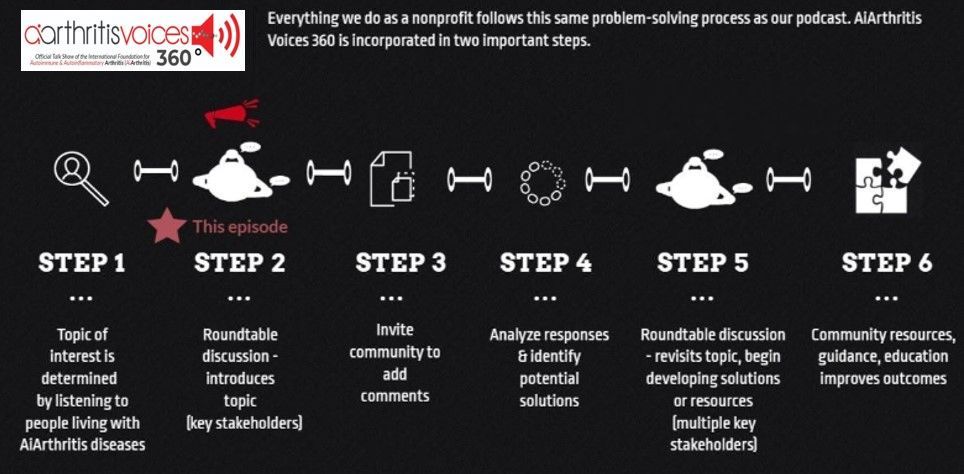
All our main 1st Sunday of the month episodes are either an initial "put the topic on the table" episode (Step 2 in our organization's 6-step problem solving process) or a "revisit to the table" episode (Step 6 in our organization's 6-step process), where we build on a past show because we have moved forward in developing help, tools, or projects around the issue (Step 5 in our organization's 6-step process).
After each show airs we spin off the conversation into many discussions over various formats, which we now call #360its (new in 2022)!
-
Additional Resources & Information
- Donate to Support the Show: https://www.aiarthritis.org/donate
- Sign up for our Monthly AiArthritis Voices 360 Talk Show newsletter! HERE
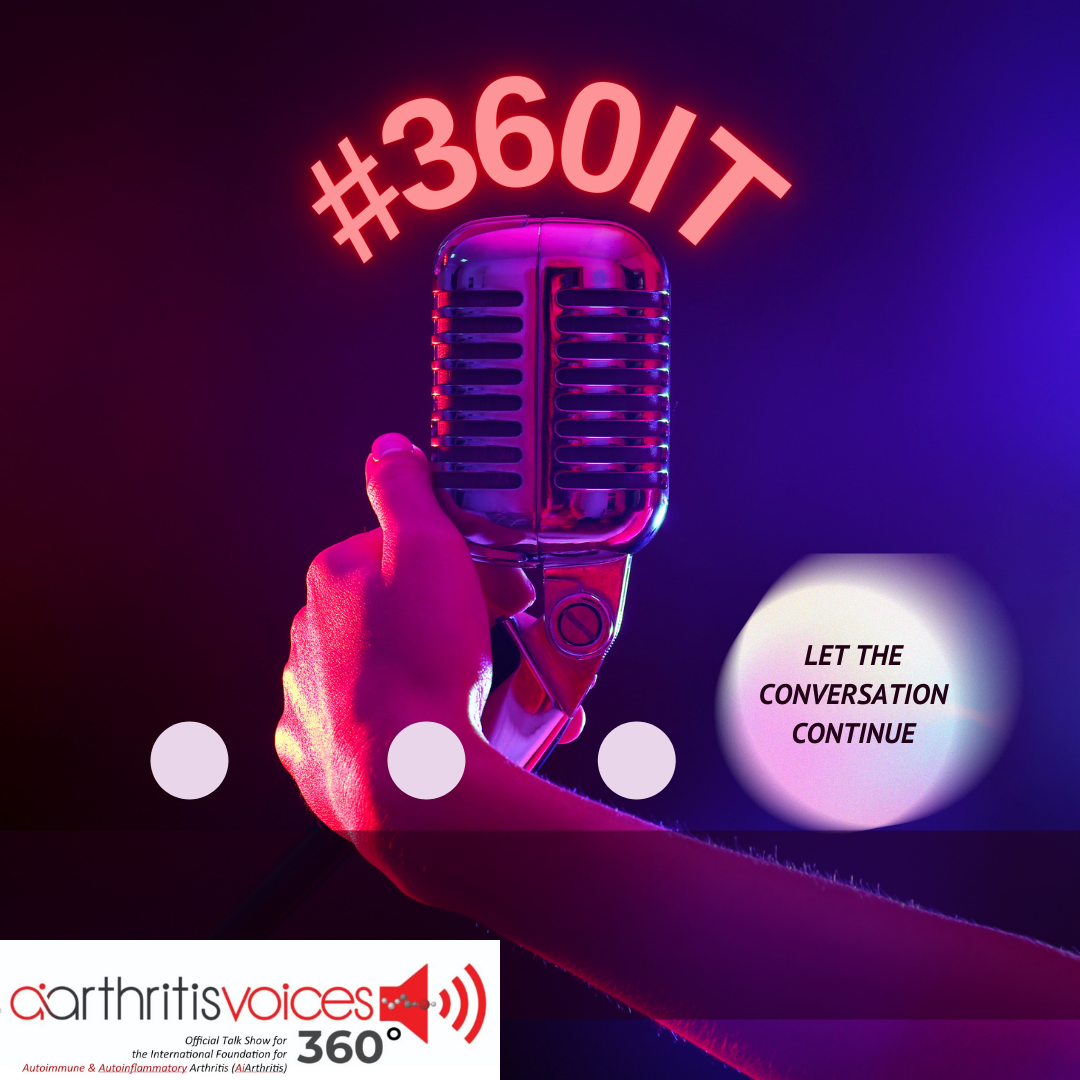
And now, let's 360it!
The main Sunday episode is where we "put the topic on the table," but it's not where the conversation ends! Now we spin off the conversation into different discussion segments. Below you will find several 360its. Some are videos from the main episode, while others are audiograms (soundbites).
Soon we will be launching additional 360its, which will build on these conversations. We'll hear from patients in the United States, Canada, and Australia who are here to help you through the transition to biosimilars. We are also planning a WATCH PARTY, where we will play back segments of webinars that aim to teach you more about biosimilars - and you'll have your fellow patients at AiArthritis to talk through it all with you! Stay tuned.
360its & SHORT VIDEO CLIPS FROM THE MAIN EPISODE (Coming Soon!)
Leila P.L. Valete
Leila is the Health Education Manager at the International Foundation for AiArthritis. She is a person living with Lupus Nephritis and Sjögren’s Syndrome. She is passionate about inclusion and diversity in health education and meeting individuals where they are at in order to learn in a way that resonates with them. Leila is on social media as @LupusLifestyle.Lei sharing bits and pieces about her life with lupus and connecting with others. Connect with her on Instagram or TikTok.
Connect with Leila:
- Instagram: @lupus.lifestyle.lei
- TikTok:
@lupus.lifestyle.lei
Deb Constien
Deb Constien is a medically retired Registered Dietitian and a Representative for the AiArthritis with Rheumatoid Arthritis. Deb is also on the Advisory Council for WREN- Wisconsin Research Education Network and a Patient Family Advisor- PFA on an International PCORI research study for ACP- Advanced Care Planning.
Connect with Deb:
- Facebook: @deb.majcherconstien
- Twitter: @debconstien
- Instagram: @debconstien
Michael Guadalupe
Michael Guadalupe is a Volunteer and Administrative assistant at AiArthritis. Michael holds a Bachelor of Arts degree from Western Illinois University and has spent over 20 years working with the public.
As a psoriatic arthritis patient himself, Michael is passionate about raising awareness about this condition and advocating for those who are living with AiArthritis Diseases. He understands the challenges that come with living with arthritis, and his own experience has given him a unique perspective that he brings to his work at AiArthritis.
Deeanne Quist
Deeanne Quist is one of the Volunteer & Administrative Assistants at AiArthritis. Having an AiArthritis disease, Deeanne is passionate about working with this organization and everything it stands for. When not working with AiArthitis, she loves to stream video games and crochet. She also loves to play with her sweet dog, Rocky.
Connect with Deeanne:
- Facebook: @deeanneofaiarthritis
- Twitter: @twistedpsister
- Instagram: @twistedpsister
Pull up your seat at the table
Now it's YOUR TURN to join the conversation!
What do you think about this episode?
We want to know what you think! By continuing the conversation with your opinions and perspectives - we all get a better understanding of the problems facing our community. Better yet, through these conversations we can start working and developing solutions.
We mean it when say 360. Not only do we want your input anytime and anywhere, but we also are eager to see where the conversation will take us. So please, "pull up a seat at the table" and let's start talking!
Email us at podcast@aiarthritis.org, message us on social media (find us by searching for @IFAiArthritis)
Relevant Episodes & Projects
-
Join us!
Learn More About VolunteeringVolunteers are at the heart of all we do, without their passion and dedication to advancing education, advocacy, and research, we could not achieve our goals to change the future. From the moment a volunteer joins our team, they become part of a community - and a family.
-
Episode 47: Teamwork Makes the Dream Work: AiArthritis WINS Best Team Performance 2020
Learn More About this EpisodeJoin Tiffany, and several of the AiArthritis show co-hosts and organization volunteers, as they watch the WEGO Health LIVE Awards ceremony ... only to learn that AiArthritis won 2020 Best Team Performance!
-
Episode 69: Changing the World from Your Sofa
Learn More About this EpisodeIn this episode, Tiffany Westrich-Robertson and Katie Simons talk about how grateful they are to the volunteers that help with every part of our organization.
Love the show? Help us make sure we stay on the air by making a donation.
Your contribution helps us continue the work we do every day to improve the lives of millions worldwide.
Sign up for our newsletters
International Foundation for AiArthritis
6605 Nottingham Ave.
St. Louis, MO 63109-2661
Toll Free: 1-877-609-4226
Text: 1-314-282-7214
Copyright 2024. All rights reserved. Information on this site is intended for informational purposes only Our foundation does not engage in the practice of medicine. Please consult a physician to obtain personal healthcare and treatment options. 501(c) 3 Nonprofit Tax ID: 27-1214308.



